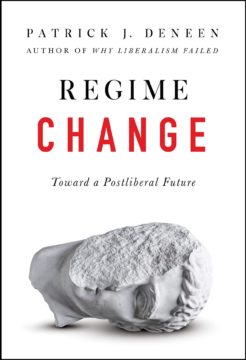 Jeffrey C. Isaac in LA Review of Books:
Jeffrey C. Isaac in LA Review of Books:
YOU CAN LEARN a lot about certain books from their covers.
The cover of Patrick J. Deneen’s latest features its two-word title—Regime Change—in caps across the center. The word “Change” appears larger, bolded in red beneath “Regime.” Below lies the disembodied head of an ancient Roman statue, knocked on its side with half of its face eroded.
What does it mean that Deneen’s newest volume is crowned by a phrase widely associated with failed, Bush-era neoconservative efforts to bring democracy to Iraq at the point of a gun? Does the destroyed image at bottom signify a tragic discarding of ancient wisdom, or does it suggest that regime change can be necessary and ennobling even if it requires smashing some idols? Or both?
Deneen’s Why Liberalism Failed was a much-discussed philippic; its 2018 publication led to the author being hailed by some and reviled by others as “The Anti-Democratic Thinker Inspiring America’s Conservative Elites.” In Regime Change: Toward a Postliberal Future, Deneen expands on the themes of his earlier book while developing a more robustly political account focused on liberalism’s failings and how it can—and must—be defeated.
Decades ago, a number of “communitarian” writers—including Christopher Lasch, Alasdair MacIntyre, Robert Bellah, Daniel Bell, Michael Sandel, Jean Elshtain, and Deneen’s revered mentor, Wilson Carey McWilliams—critiqued liberalism for its narcissism, possessive individualism, and animus toward traditions and moral limits. Read generously, Regime Change seeks to repurpose this critique for 21st-century America. Had this book appeared a decade ago, such a reading might at least seem tenable.
But the book appeared a few months ago, during a time in which a dark and authoritarian anti-liberalism has risen to prominence and power in many liberal democracies, including the United States. Read under the shadow of this new authoritarianism, the book registers as both insidious and dangerous.
More here.
